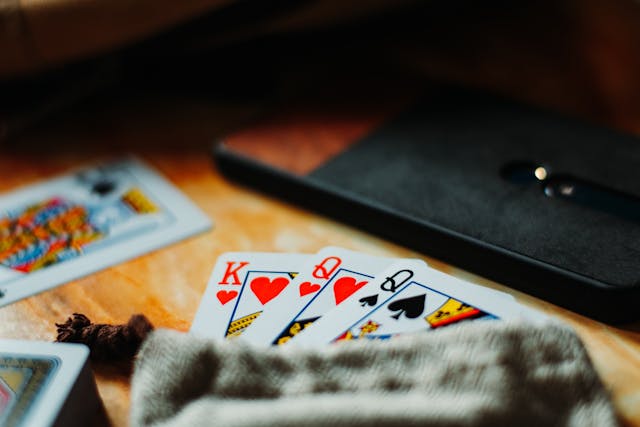Poker is one of the most strategic card games in the world, but improving at it requires more than just logging hours at the table. Players who want to refine their edge often benefit from studying other card formats. Games like blackjack, gin rummy, and bridge strengthen probability skills, sharpen memory, and highlight different ways of managing risk. While each of these games has its own identity, the mental tools they develop can carry over directly into poker.
Learning Probability from Blackjack
One of the fastest ways poker players can improve their sense of probability is through blackjack. Unlike poker, blackjack pits players against a dealer with very clear mathematical rules. Every decision can be broken down into odds and probabilities. This structure makes blackjack a useful training ground for poker players who want to strengthen quick mental calculations.
For instance, observing decision trees in blackjack games can help poker players refine risk assessments. By analyzing different blackjack hands and comparing how choices like hitting, standing, or doubling down impact long-term outcomes, poker players learn to evaluate situations with clarity. Spending time with these structured scenarios in Blackjack Games Cafe Casino helps players carry sharper judgment back to the poker table, especially in moments where intuition and probability collide.
Strategy Lessons from Blackjack Splitting
Building on this, deeper strategy concepts in blackjack also offer lessons for poker. One example is the decision of when to split cards. The process involves not only recognizing strong starting hands but also predicting future probabilities and weighing risk against potential reward.
A detailed explanation of this decision-making process can be found in resources on when to split in blackjack and what it means. This guide illustrates how knowing when to split can maximize opportunities while minimizing unnecessary losses. For poker players, the takeaway is the importance of context—sometimes it’s correct to push forward aggressively, while at other times, restraint protects the bankroll. Poker, much like blackjack, rewards players who can recognize when conditions justify boldness and when they call for patience.
Memory Training Through Gin Rummy
While blackjack focuses on probability, gin rummy trains memory and tracking skills. In rummy, players must remember discarded cards, track opponents’ possible hands, and anticipate future plays. These mental habits mirror the memory work in poker, where keeping track of folded cards, bet patterns, and opponents’ tendencies creates a stronger overall strategy.
By practicing rummy, poker players sharpen the mental discipline of observation. The more naturally one can recall past actions, the easier it becomes to spot inconsistencies or patterns at a poker table. This is especially helpful in long tournament sessions where small memory lapses can cost critical pots.
Bridge and the Power of Team-Based Thinking
Bridge adds another layer of complexity. Unlike poker or rummy, bridge requires communication between partners. The game builds skills in coordination, inference, and long-term planning. Poker players often focus on individual decisions, but thinking in terms of sequences and anticipating multiple layers of action helps in multi-street betting scenarios.
For example, a strong bridge player learns how one early play sets up the strategy for future tricks. In poker, this lesson translates into thinking about how an early bet shapes perceptions later in the hand. Bridge encourages patience, foresight, and a broader perspective—all qualities that strengthen poker decision-making.
Why Studying Other Games Matters
Poker has endless depth, but improvement often comes from looking outside of it. Other card games highlight skills that poker alone doesn’t always emphasize. Blackjack pushes probability, rummy sharpens memory, and bridge enhances long-range planning. By combining these lessons, poker players develop a toolkit that makes their decision-making sharper and more adaptable. Here’s a quick breakdown to refer back to:
This table highlights how sharpening probability through blackjack, training memory with rummy, and building foresight in bridge can all be directly applied to poker decision-making. Recognizing these cross-game skills not only helps players improve strategically but also ensures they approach poker with a more disciplined and analytical mindset.
Bringing It All Together
The crossover between card games shows that poker players improve not just by playing poker itself, but by broadening their horizons. Playing a wide range of games will create a more complete player who is prepared for both the mathematics and psychology of the table.
Poker is often described as a game of incomplete information. Any edge gained in understanding probability, or improving memory and long-term planning, becomes valuable. Studying other card formats equips players with exactly those advantages. For those serious about growth, it’s worth the time to step away from the poker felt and explore how other games sharpen the same mental muscles.


